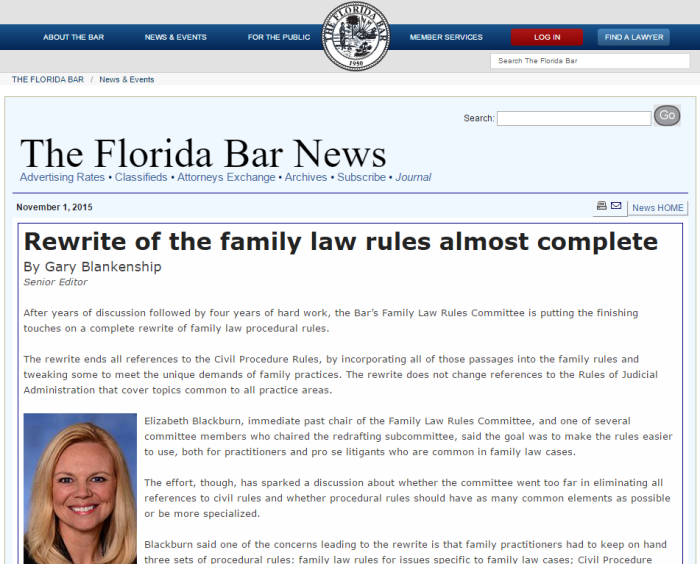 Rewrite of the family law rules almost complete
Rewrite of the family law rules almost complete
By Gary Blankenship
Senior Editor
After years of discussion followed by four years of hard work, the Bar’s Family Law Rules Committee is putting the finishing touches on a complete rewrite of family law procedural rules.
The rewrite ends all references to the Civil Procedure Rules, by incorporating all of those passages into the family rules and tweaking some to meet the unique demands of family practices. The rewrite does not change references to the Rules of Judicial Administration that cover topics common to all practice areas.
 Elizabeth Blackburn, immediate past chair of the Family Law Rules Committee, and one of several committee members who chaired the redrafting subcommittee, said the goal was to make the rules easier to use, both for practitioners and pro se litigants who are common in family law cases.
Elizabeth Blackburn, immediate past chair of the Family Law Rules Committee, and one of several committee members who chaired the redrafting subcommittee, said the goal was to make the rules easier to use, both for practitioners and pro se litigants who are common in family law cases.
The effort, though, has sparked a discussion about whether the committee went too far in eliminating all references to civil rules and whether procedural rules should have as many common elements as possible or be more specialized.
Blackburn said one of the concerns leading to the rewrite is that family practitioners had to keep on hand three sets of procedural rules: family law rules for issues specific to family law cases; Civil Procedure Rules for when the family law rules say an issue will be governed by civil rules; and the Rules of Judicial Administration for items common to all practice areas, such an e-filing, court procedures, and protection of confidential information.
“If the Civil Procedure Rules Committee makes a change and the Supreme Court ultimately approves the change, then family law rules are automatically bound by that change,” Blackburn said. “What has happened over time is sometimes those changes have not been suitable for family. What we have done in this proposed amendment package of rules is we are not making changes willy-nilly. In many instances the language of the existing civil rule is carried over in its entirety.”
What the subcommittee did, she said, is take all of the civil rules that were referred to in the family rules and put them in the family rules, ending all civil references.
“It gives us the ability to not have to react when another rule body makes a change that impacts us,” Blackburn said. “In family law, some things are unique.”
As an example, she cited discovery issues, where family law had some of its own rules and others still referred to civil rules.
“We have unique discovery obligations,” Blackburn said. “We already had a rule over what has to be disclosed. We also have general discovery rules that govern our practice. We had to be careful and cautious about what, if any, changes we made.”
Another concern was self-represented parties, who make up a large portion of family law cases.
“Our practice more than any other is impacted by pro se litigants and it will continue to be impacted,” Blackburn said. “Perhaps the goal isn’t to make sure every pro se litigant knows what to do, but we do have to be mindful to make the process accessible. . . .
“Now [except for the RJA matters] you don’t have to keep flipping back and forth between a family law rule and a civil rule. It’s all going to be in one place. We are hoping it makes it easier.”
The rewrite effort has earned the endorsement of the Family Law Section, which made suggestions for minor improvements and were accepted by the rules committee, when the tentative rewrite was published for comment in the August 1 Bar News. The revised rules will be published again for comment in the News before the rules are submitted to the Bar Board of Governors. Any comments the board makes will be submitted with the rules rewrite when it goes to the Supreme Court, and it will again be noticed for comment.
“It’s been a really collaborative effort,” said Family Law Section Chair Maria Gonzalez. “We’re pleased with all of the hard work that’s been put into this. I do believe it’s going to be a good and favorable product for all of the practitioners in the field. It gives more clarity. Any time it gives more clarity to specific rules, I think it can only assist practitioners.”
Two outside issues may draw extra attention to rewrite of the family law rules. One is an interest expressed by the Supreme Court in reducing the size of procedural rules, perhaps by as much as 50 percent. The Board of Governors Program Evaluation Committee is studying procedural rules and ways to simplify them and could have a report by the end of the year.
The second issue is an ongoing debate over how specialized specific procedural rules should be, as opposed to having more rules in common between the various rules sets.
Both issues were discussed at the Rules of Judicial Administration Committee meeting when it met September 18 at The Florida Bar’s Fall Meeting – immediately after the Family Law Rules Committee met and adopted its modifications to the new rules.
The RJA Committee discussed an ongoing review by the Board of Governors Program Evaluation Committee on the procedural rules and ways of simplifying them and rejected a motion to recommend that the Board of Governors appoints a special committee with “knowledgeable members” to explore that issue. The RJAC instead took no action beyond its discussion.
The committee had an extensive discussion about the revised family rules directly incorporating civil rules and ending the references to civil rules.
RJA Committee member Paul Regensdorf said what the new family rules do is “with the absolute best of intentions take about 15 to 20 basic rules of procedures, contexts that every lawyer uses, and copy them or tweak them. . .and now they’ve put them in a whole new rule.”
That rule, he said, will inevitably be interpreted by judges and differences will creep in between the family rules and similar rules in other practice areas, ultimately creating a more complex rule structure for lawyers who practice in several areas and for judges who handle different kinds of cases.
“The civil rules are a basic set of concept rules,” Regensdorf argued. “A deposition is a deposition is a deposition. In the motion rules, a motion is a motion is a motion. It doesn’t need to be written in a second place.”
In a computerized world, he added, it’s easy for practitioners to flip back and forth between electronic family, civil, and RJA rule sets.
The RJAC rejected a motion to develop a committee response to the new Family Law Rules and instead voted to instruct Chair Amy Borland to prepare a comment, based on a subcommittee’s review of the new rules and how they deviate from past practices, for when the rules are submitted to the Supreme Court.
Source: Rewrite of the family law rules almost complete
 Tallahassee, Florida — A proposal creating a 50/50 arrangement to share time with children after divorce moves one step closer to becoming law.
Tallahassee, Florida — A proposal creating a 50/50 arrangement to share time with children after divorce moves one step closer to becoming law.
A senate panel Wednesday passed a bill that overhauls Florida’s alimony system.
The proposed law:
- Ends permanent alimony
- Creates a formula for figuring out the amount and length of alimony payments
- Includes the 50/50 time sharing arrangement with children, but allows a judge to establish an unequal time sharing agreement based on different factors.
“I think some people believe the best interest of the child is to be with one parent predominantly over another. That’s just their fundamental belief. I fundamentally believe that 50/50 is the right posture,” said Sen. Kelli Stargel (R – Lakeland), the sponsor of SB 1248.
In 2013, Gov. Rick Scott vetoed a similar bill that applied retroactively to divorce cases already settled. This measure does not include that. It now moves on to its third committee stop.














Reblogged this on World4Justice : NOW! Lobby Forum..
LikeLiked by 4 people
The FBI has requested a list of New Jersey people who have been defrauded by family court judges, lawyers and experts working in suspected collusion to create deliberate conflict for cash. Please forward:
Name
Address
Email
Phone
County
Judge
We need this no later than December 15th. Thanks. Groberts@fclu.org
LikeLiked by 4 people
LikeLiked by 2 people
[…] Rewrite of the Florida Family Law Rules almost complete. […]
LikeLiked by 3 people
My name is Cindy and I have 3 beautiful babies. They were stolen by the state because I couldn’t pay my light bill. I paid my rent instead. It was for temporary. But it was a lies. I protested and they came after my husband saying we’re upsetting the wrong people. Really? And threatened us saying we’re never going to see our babies. My babies are in danger. Rick Scott and pam bondi won’t do nothing. Theirs pedophiles and molesting and murdering us babies under cps and foster care. 7% gets rape and murder and timely abused. 20% gets stolen by cps. They are sick twisted and diguesting pedophile s. My baby girl Abby 6 told me someone touched her and they tell me to call 1800 number. Sick pervert s. I had enough. I told them I’m taking my babies to the FBI. Put instead they had sheriff dupty put deadly thumb lock on my windpipe. Chocking me and not securing my baby daughter. Sick fuckers. She could of being dropped and could crushed her skull. My baby son Brandon 17 asked why his mom was being arrested? They told him to shut up. Disgusting pigs. Telling my baby and threatening him. They slammed him against the wall and arrested him. God help them. As a mom watching that and seeing that. I as a mom can do anything. Not letting my husband see his own babies. Criminalizing him and saying his mentally ill. Because his intelligence level is better then theirs. All because of no lights. My name is all Brandon 17 Alex 14 and Abbygail Lilly 6. Please know one listen.
LikeLiked by 3 people
[…] Rewrite of the Florida Family Law Rules almost complete. […]
LikeLiked by 3 people
LikeLiked by 1 person
[…] Rewrite of the Florida Family Law Rules almost complete. […]
LikeLiked by 3 people
LikeLiked by 1 person
[…] Rewrite of the Florida Family Law Rules almost complete. […]
LikeLiked by 3 people
LikeLiked by 1 person
[…] Rewrite of the Florida Family Law Rules almost complete. […]
LikeLiked by 3 people
LikeLiked by 1 person
[…] Rewrite of the Florida Family Law Rules almost complete. […]
LikeLiked by 1 person
LikeLiked by 1 person
[…] Rewrite of the Florida Family Law Rules almost complete. […]
LikeLiked by 1 person
LikeLiked by 1 person
[…] Rewrite of the Florida Family Law Rules almost complete. […]
LikeLiked by 1 person
LikeLiked by 1 person
[…] Rewrite of the Florida Family Law Rules almost complete. […]
LikeLiked by 1 person
LikeLiked by 1 person
[…] Rewrite of the Florida Family Law Rules almost complete. […]
LikeLiked by 1 person
[…] Rewrite of the Florida Family Law Rules almost complete. […]
LikeLiked by 1 person
[…] Rewrite of the Florida Family Law Rules almost complete. […]
LikeLiked by 1 person
[…] Rewrite of the Florida Family Law Rules almost complete. […]
LikeLiked by 1 person
[…] Rewrite of the Florida Family Law Rules almost complete. […]
LikeLiked by 1 person
[…] Rewrite of the Florida Family Law Rules almost complete. […]
LikeLiked by 1 person
[…] Rewrite of the Florida Family Law Rules almost complete. […]
LikeLiked by 1 person
[…] Rewrite of the Florida Family Law Rules almost complete. […]
LikeLiked by 1 person
LikeLiked by 1 person
[…] Rewrite of the Florida Family Law Rules almost complete. […]
LikeLiked by 1 person
[…] Rewrite of the Florida Family Law Rules almost complete. […]
LikeLiked by 1 person
[…] Rewrite of the Florida Family Law Rules almost complete. […]
LikeLiked by 1 person
[…] Rewrite of the Florida Family Law Rules almost complete. […]
LikeLiked by 1 person
[…] Rewrite of the Florida Family Law Rules almost complete. […]
LikeLiked by 1 person
[…] Rewrite of the Florida Family Law Rules almost complete. […]
LikeLiked by 1 person
[…] Rewrite of the Florida Family Law Rules almost complete. […]
LikeLiked by 1 person